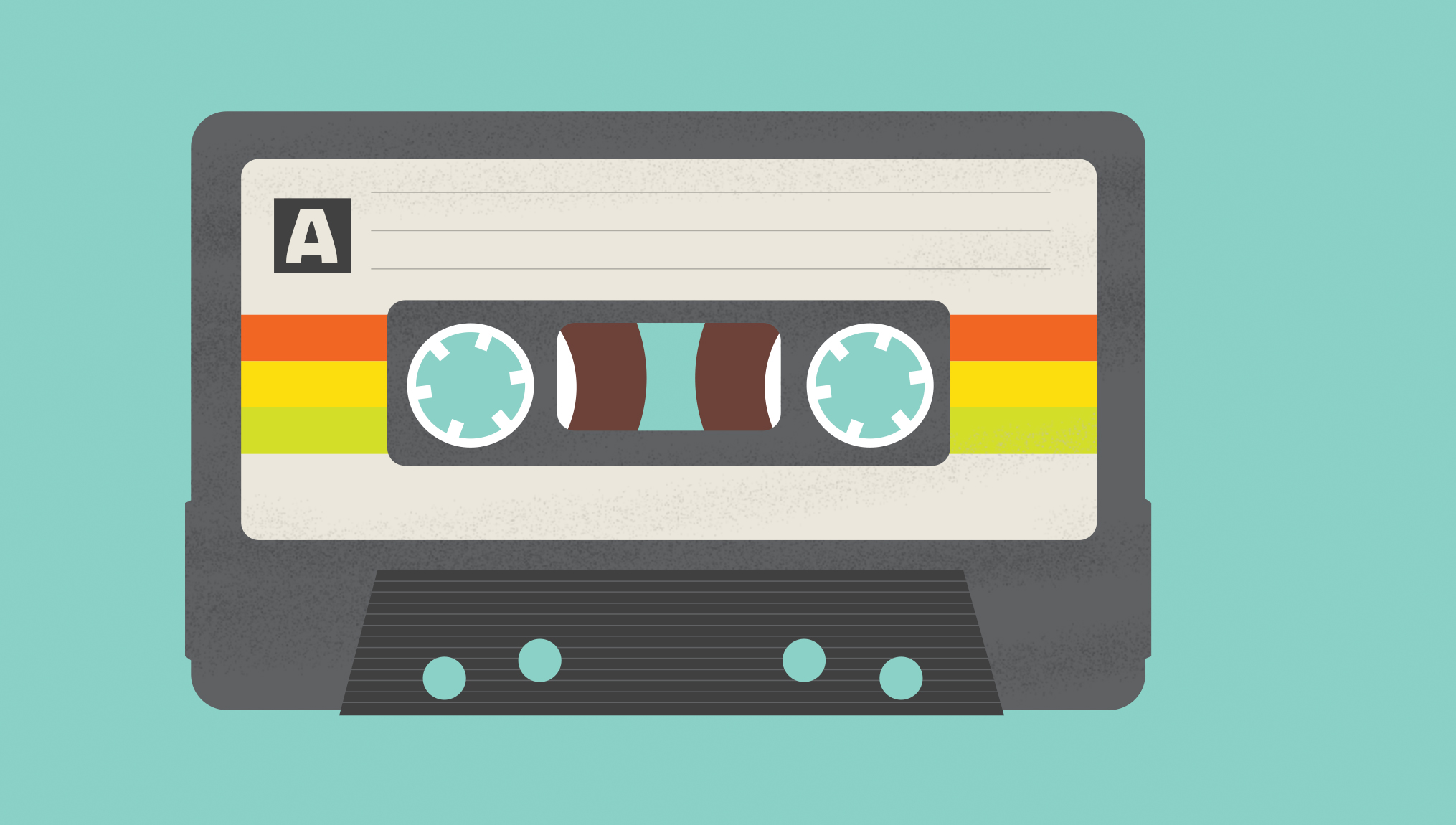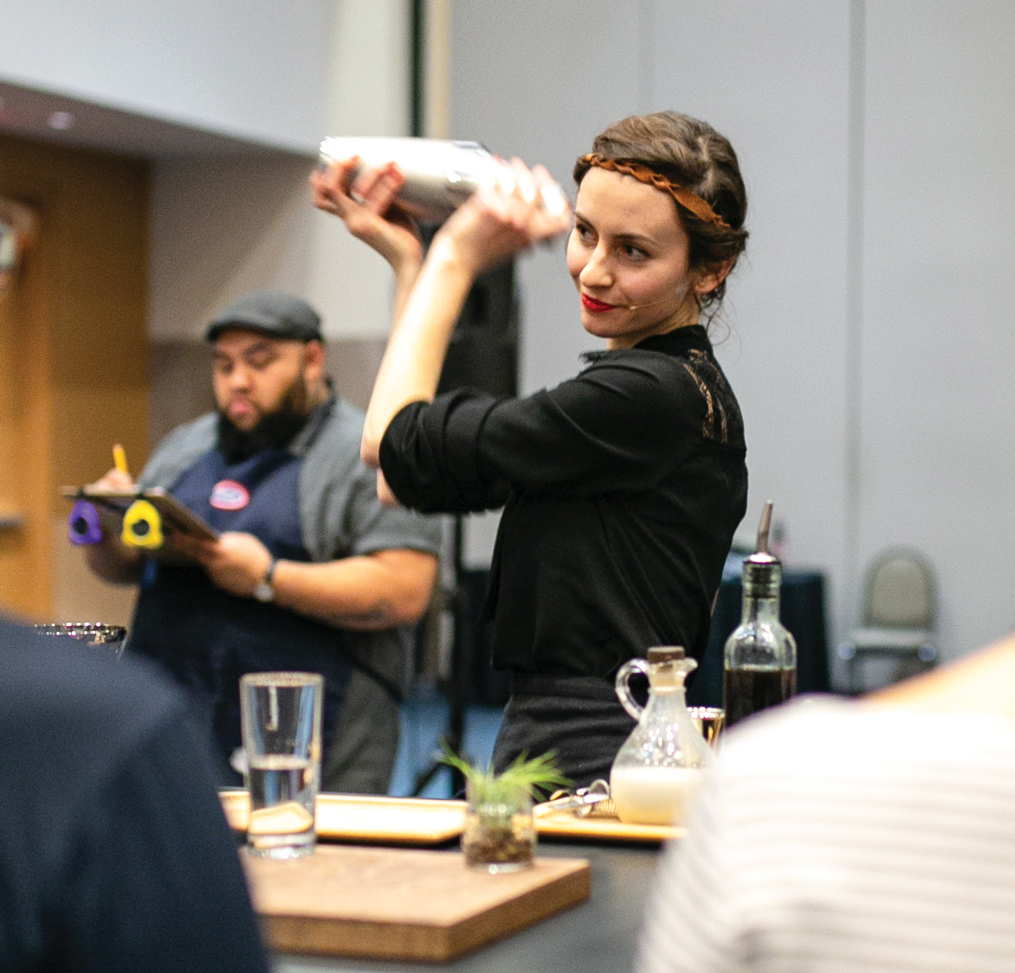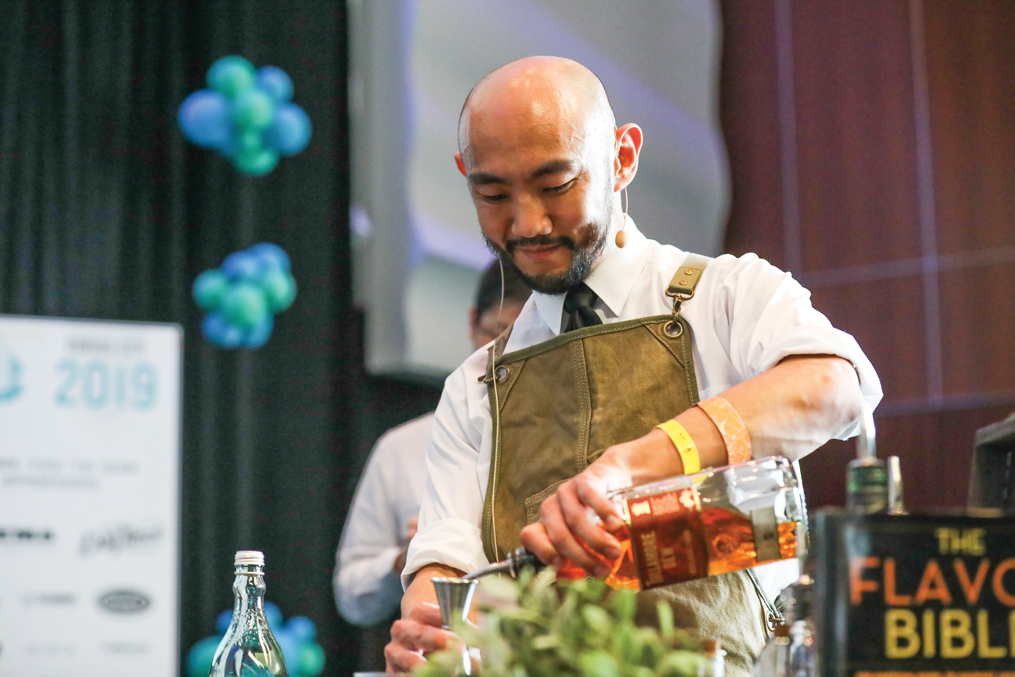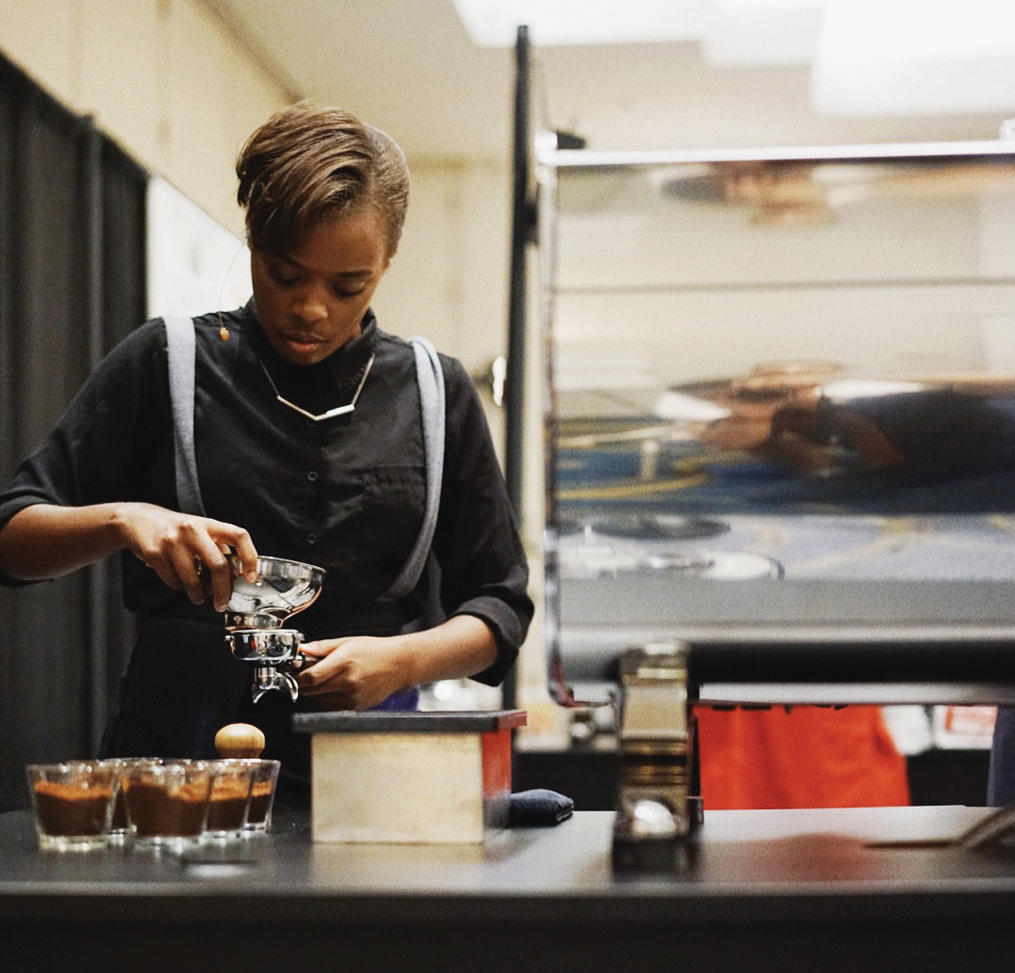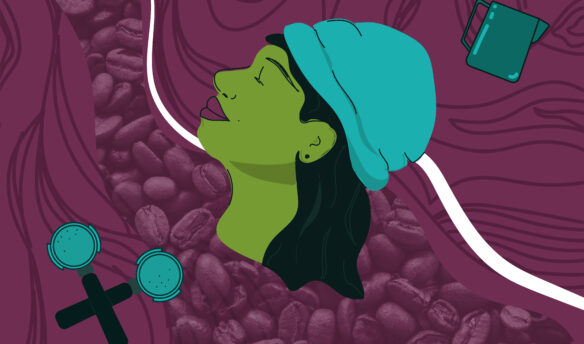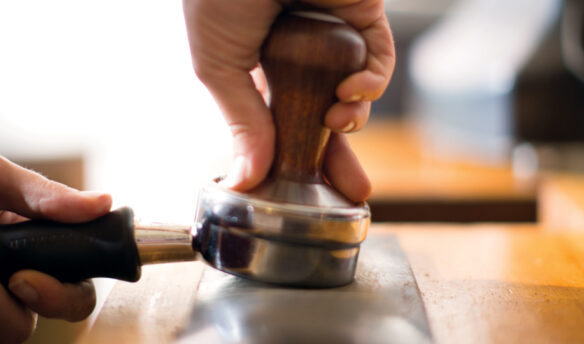“The making of a good compilation tape is a very subtle art. Many do’s and don’ts.”
[W]hen Rob Gordon, played by John Cusack, declared this truth in the 2000 film High Fidelity, he was talking about curating a mixtape for his girlfriend—but he may as well have been a barista riffing on the craft of competition playlists.
“A run-through is like a dance routine; it’s choreography, and the music has to roll with that,” says Michelle Johnson, better known as the provocateur behind The Chocolate Barista. She is but one of the many baristas who have agonized over their music selections as much as their sig bevs. For many competitors, the music is the tie that binds the whole routine together.
“You want to create a fully formed experience, and music, as it does in life, helps accentuate that,” says Rock Baijnauth, director of Barista and Baristas, two films following a handful of baristas on their journeys to the 2013 U.S. Barista Championship and the 2017 World Barista Championship, respectively. Having watched many competitors closely in their preparations, Baijnauth has seen a variety of approaches to creating the playlist, from Johnson’s style to choosing the music during final run-throughs. The most successful competitors, however, have one thing in common.
“The ones that I’ve seen that have been really successful have always flowed together,” he explains. “It’s not just a bunch of songs that the person likes. The songs actually tell a story in themselves.”
For longtime head judge Nathanael May, the impact of the music is in the mood.
“There has never been a single barista competitor where I haven’t noticed the music,” says May. “Music plays a critical component in the whole ambiance of the performance and the energy and the vibe that the competitor is bringing.”
And while the music can’t technically affect scores (outside of explicit content [see p. 43], which the rules state can lead to docked points), May emphasizes the way it can shape the judges’ perception of a barista’s whole performance.
“Everyone’s serving coffee, everyone’s serving a milk drink, but no two competitors really have the exact same music,” he says. “It’s such an interesting way to present yourself as a broader and more layered human being than just a coffee professional who likes competitions.”
Still, competitions are about more than mere self-expression.
“A lot of what the baristas are doing is recreating, in their own small way, a café experience for the judges,” May explains. “The judges are ideally supposed to be the best customers you’ve ever had.”
And as any barista knows, café experiences are anything but dull. The best routines evade feeling like a science or agriculture lesson. They’re not “dry” or overly “technical,” to use Baijnauth’s words. Instead, they transport you to a place where coffee is once again a beverage potent with possibility. It’s like rediscovering your favorite café for the first time. And the music is often the subtle soundtrack for this transformation.
But what does it look like to make the mix? Three competitors shared how they do it.
The Bridge
Hannah Craig | Full Stop Station | Louisville, KY
When Hannah Craig was preparing for her first competition run—the 2017 regionals in Knoxville, Tennessee—the music wasn’t first on her mind. The mechanics of her routine, finding the right coffee, and developing her signature beverage consumed her attention.
Her coach was thinking about it though, and would make suggestions along the way—but nothing was quite connecting.
“Every time I presented with it, it just didn’t feel like me,” recalls Craig. “I just didn’t have any other ideas.” What she was looking for, but didn’t realize it at the time, was a bridge—something that would serve as a link from the coffee to both her routine and her personality.
Then, just two weeks before competition, her husband offhandedly suggested they try Shakira. They cued up “Hips Don’t Lie,” and they knew they had found the right groove. The music of Colombia’s most famous pop singer synced perfectly with the Colombian coffee Craig had selected for her routine.
“Her music was so colorful and so exciting, and that’s how my coffee was,” she says. “It meshed well together.” She ended up rounding out her playlist with three more Shakira tracks.
The choice also fit her desire to make an impression as a first-time competitor, to grab attention and build yet another bridge with her presentation.
“It was inviting the judges into a culture that was very different from ours,” she explains, noting that the music achieved this in a way that was warm, fun, and hospitable.
Still, she wouldn’t have gone with it if it hadn’t reflected her own taste. Finding a way to be true to herself and elevate her coffee and presentation proved to be a winning recipe for Craig, who advanced to nationals that year.
Listen to Hannah’s playlist here
The Downbeat
Matt Foster | Kaldi’s Coffee Roasting Co. | St. Louis, MO
Through two seasons of Brewers Cup, Matt Foster favored upbeat music, such as Michael Jackson, Whitney Houston, and Justin Timberlake, to lighten up his routines.
That changed in 2018, when he shifted to laid-back jazz and electronica to calm his nerves and help him focus.
“I found that it helped me bring more balance to my presentation in order to rein myself in,” says Foster. “My natural tempo, especially when I’m on stage, is more upbeat. I get excited, I tend to talk very fast, but if I hear a more calming music in the background it sort of reminds me to balance myself out a little bit more.”
He took this a step further during prep for the inaugural U.S. Coffee in Good Spirits competition earlier this year. After noticing that the jazz and “chillhop” he was spinning didn’t quite seem to harmonize with his cocktails or the elegant, refined aesthetic of his decor, Foster decided to mix it up.
“Kind of on a lark, I pulled up a couple of Mozart songs and I put that in the background, and it really just seemed to tie together,” he recalls. It proved to be the perfect backdrop for pacing his presentation and staying calm. He even named one of his drinks “Mr. Romo’s Opus,” highlighting his coffee’s producer Fausto Romo as a composer in his own right.
Foster rode that downbeat vibe to become the first-ever U.S. Coffee in Good Spirits champion. His victory reflects something about his mentality as a competitor. Although music might have complemented his routine, he was aiming for much more.
“Competitions really are about understanding the competition itself, doing everything you can to control the variables and getting every single one of those points,” he explains. “So, everything you do, including the music, needs to be honed in on—‘Will this let me nail my routine so that I don’t go over time, because it lets me keep pace, because it puts me in a good mental space?’”
Listen to Matt’s playlist here
The Mixtape
Michelle Johnson | Coffee Manufactory | Los Angeles, CA
For some competitors, the music is front and center.
“I think about the music before I start prepping anything for the competition,” says Michelle Johnson. “Because for me it’s all about setting the vibe and the energy of what the routine is going to end up being.”
Johnson, who has competed during three different seasons, usually builds a big mix during her prep, which she later culls down to the three or four tracks that will form the backbone of her routine. During competition, she relies on that playlist not only to support the mood and message of her presentation, but also to orient her and keep her steady.
This music-first approach is not all that different from a shift behind bar, where Johnson acts as both barista and DJ at Coffee Manufactory in Los Angeles.
“It’s more like I’m at the coffee shop where I have control over the music and the whole energy of the shop altogether, and that’s where I feel most comfortable,” she says. Behind bar, she lets the time of day, the clientele, and the mood of the room shape her music choices. While the criteria may be different at USBC, it’s that same awareness that helps Johnson feel at ease when the pressure of competition rises.
When it comes down to it, though, she says she tries not to let the room influence her too much. Her ultimate goal as a competitor isn’t to dazzle the crowd or impress the judges.
“I’m not really thinking about anyone else when it comes to my music,” says Johnson. “I’m not really competing for anyone else. I’m just doing it for myself, and if I do ever go into competition again, that’s a really strong point that I’ll be making to myself.”
Listen to Michelle’s playlist here
You Can’t Always Get What You Want
As many competitors will tell you, when you’ve run through a routine hundreds of times, all with the same backing track, the music begins to provide a compass to guide you to safety before the time runs out. Baristas listen along for audible cues in the songs that signal where they should be in their routines.
No matter how entwined the music may become with any barista’s presentation, though, it’s important to maintain perspective. Baijnauth realized this during filming of Baristas, when music was prohibited during the first round at the WBC, throwing a lot of competitors off of their game.
As someone who has seen many routines go wrong, May emphasizes that no one should hang an entire performance on any one piece.
“There are so many contingencies that can happen,” he says, “and I would highly recommend that competitors plan for that and don’t let those kinds of things completely torpedo their chances at success.”
Still, no matter the obstacles, competition music is here to stay. Getting it just right may be a subtle art, but champion baristas, much like Tom Petty, won’t back down. Or they’re survivors, like Beyoncé. Either way, they’ll keep trying to win…and craft the perfect playlist.
The Times They Are A-Changin’
As the SCA continues to strive toward a more inclusive competition circuit, the rules and expectations surrounding music present an interesting challenge.
Rule 8.5b of the 2019 USBC rules and regulations states, “Music may not contain profanity, otherwise the competitor’s score on ‘Overall Workflow’ may be penalized on the head judge scoresheet.”
As straightforward as that might sound on paper, the reality isn’t quite so clear-cut.
“It’s entirely up to the judges’ discretion as far as the explicit content,” says Nathanael May, who has been judging competitions since 2010. “If an explicit lyric exists in a song, it’s not necessarily a done deal that you’re going to lose points on your presentation and professionalism for that. It’s kind of contextual, which I appreciate, because that allows flexibility and allows for there to be judgment.”
Where there is room for judgment, though, there is room for bias. It can be difficult for competitors to know just where the lines will be drawn, or just what musical aspects of their own cultures are acceptable.
“When I present myself to the coffee community, I want to be able to present all parts of myself as a barista, and that includes hip-hop and R&B,” says Michelle Johnson. “That has nothing to do with my coffee knowledge or professionalism, or whether my espresso tastes good or not.”
In an environment where families are present and everyone’s definition of “professionalism” isn’t the same, these aren’t easy judgment calls to make. But they are questions that baristas and managers face every day in cafés.
As more managers recognize the need to diversify staffing in their shops, and to create a safe space for everyone in their neighborhoods, questions about music inevitably arise. In Hannah Craig’s view, competition—with its design to push the industry and shape better all-around baristas—should be driving these conversations.
“We’re playing all kinds of different music in our cafés, and the competition floor should be, in my opinion, more true to how our cafés are,” she says. Too many people misunderstand or write off genres that they don’t understand, she adds, and competition presents an opportunity to challenge that.
Since 2017, the SCA has incorporated a mandatory unconscious bias training into its instruction for judges. While it hasn’t explicitly addressed music, May, who is also the National Competitions Coordinator, wonders if it should. Beyond dealing with unwarranted sensitivity to certain genres, this training could also prevent judges from favoring certain competitors simply because they liked their playlists.
“My hope would be that competitors would feel more comfortable being themselves,” says May, “playing the music they want to play, offering the drinks that they want to offer, speaking in a way that represents themselves and their culture and who they are, than they would if that bias training wasn’t happening.”



